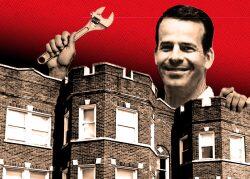First came the lawsuit, then the sale.
Tenants sued Pangea Properties, once among the city’s largest landlords, in the summer of 2022, alleging it allowed buildings to fall into disrepair and risked the safety of renters. A few months later, Pangea sold off its Chicago holdings.
That case introduced tension between the landlord and its tenants, but it is not the only lawsuit Pangea is tied up in from its time in Chicago. After being sealed from the public for years, another lawsuit came to light accusing Pangea of systematically overcharging tenants who had Section 8 vouchers.
This one revolves around an ex-employee, whistleblower Antoni Muhawi, who accused the national real estate giant of “systematically and deliberately” charging the Chicago Housing Authority, or CHA, more rent for Section 8 tenants than it charged unassisted tenants living in comparable units. Muhawi filed the civil lawsuit on behalf of the government and could receive a portion of damages.
New documents from that case suggest that the landlord’s approach to voucher holders can slip through the cracks of regulators and could be common among owners who rent to Section 8 tenants.
And, though Pangea is no longer a landlord in Chicago, the company still owns buildings elsewhere. Meanwhile, if the overcharging accusations do bear out, it is unclear if the Section 8 program would implement any guardrails.
When a landlord charges a Section 8 tenant higher rent, the extra bill gets paid by federal tax dollars, via local authorities like CHA. The federal government spent $30.3 billion on the Housing Choice Voucher or “Section 8” program in 2023, a little less than half of its $67 billion federal housing assistance budget, according to the Department of Housing and Urban Development.
The voucher program determines the “fair market rent” of a unit based on an area’s median rent and requires landlords to adhere to this rate in their tenancy approval paperwork. It also asks landlords to report the most recent rents charged for similar units in the building and prohibits charging voucher holders more than unassisted renters.
The Muhawi case dates back to an incident from January 2015, when an investigator with CHA’s Office of the Inspector General received a complaint from a Section 8 tenant.
The tenant toured an apartment with Pangea Real Estate — a subsidiary of Pangea Properties — and was told the rent was $820 per month, according to internal emails filed as evidence in the lawsuit.
When she said she had a Section 8 voucher, Pangea told her the rent would be $970.
“Sounds like this is somewhat of an issue with the larger landlords,” an investigator with the Inspector General told the voucher program’s director, Cheryl Burns, via email. “Hard to catch when [they] still stay within the fair market rate that CHA is willing to pay.”
A spokesperson for Pangea said the company does not comment on ongoing litigation.
In a response to the whistleblower complaint filed in court, the company denied some of the stronger allegations of fraud or “systematic” behavior but admitted it charged more rent to Section 8 voucher holders than unassisted renters “in some instances.”
The whistleblower’s complaint alleges that Pangea had an “established internal policy” instructing property managers and leasing agents to quote new Section 8 tenants a monthly rent price $150 higher than the target rent for the unit. This amount matches what the Section 8 renter told the CHA in her complaint.
Pangea is also suing one of its insurers for denying coverage to help pay for the more than $650,000 in legal defense costs it has racked up in the whistleblower case thus far.
The CHA investigation
The evidence in the whistleblower case reveals the mechanics of overcharging Section 8 tenants — and names Pangea and its subsidiaries as alleged offenders.
Not long after the potential tenant toured the unit and heard about the rent markup, CHA and its Inspector General began investigating Pangea. In April 2015, Burns emailed the company asking to review its rent rolls for buildings with Section 8 tenants.
After receiving this, Pangea’s chief financial officer, who appeared to be Patrick Borchard, sent out an internal email that was filed as evidence in the lawsuit.
“Oh sh*t, not good news … Definitely can’t send all rent rolls as is,” he wrote. “Probably need to dig in and identify some possible, selected rent rolls that show the least variance from market for our [Section 8] guys. Is that what you’re thinking to provide?” Borchard continued.
The company then told Burns it did not have to provide the requested information. Burns responded by citing the portion of the CHA contract that gives it the right to ask for rent information, according to court filings. At that point, David Jaffee, then Pangea’s operations manager, fired off another internal email about how to respond.
“If we decide we have to, I can set up roadblocks to make analysis difficult — Limit info to building, unit, rent. Print to PDF, then rescan it so they can’t scrape any data,” Jaffee wrote. “I can also start compiling the damage here to see how d*mning the evidence is if you think it’s worth it.”
And that’s just what they did, first mailing hard copies of spreadsheets and then sending PDF files with incomplete data that lacked unit numbers and postal addresses, according to an order filed by District Court Judge Manish S. Shah that summarized the case’s initial findings. At one point, Burns threatened to recommend that CHA stop accepting requests from the company to house Section 8 tenants.
With the data provided to them, CHA analysts were only able to identify 51 units with Section 8 tenants due to missing or “inconsistent” information, according to court filings. Of those, 40 had a rent that was higher than the rent charged to an unassisted tenant living in a comparable unit, meaning a unit in the same building with the same bedroom size and number of baths.
Adding up the differences in rent charged for just that sample of 51 units, “we are potentially losing upwards of $4,000 each month,” one of the CHA analysts said in an email. At that time, Pangea had a total of 1,130 units with Section 8 tenants.
Burns summarized these findings in an email to her boss, Katie Ludwig, deputy chief housing officer at the time.
Then, nothing.
Burns testified that no final determination was made in the investigation and CHA did not continue asking Pangea for complete data so that a true analysis could be done. She said she did not remember why CHA stopped investigating the issue, according to court filings.
Meanwhile, the whistleblower had only been working for Pangea for a few months when he noticed the firm was overcharging and brought it up to his supervisors, who did not seem concerned, according to court filings. He was forced to resign shortly before filing the lawsuit in 2018.
Pangea was the largest landlord renting to Section 8 tenants in Chicago at that time, Burns testified. It began housing Section 8 tenants in about 2012 and continued to do so until it sold off its Chicago buildings in 2022.
Burns said she had never encountered an investigation like that one in over a decade of working with CHA.
This doesn’t mean that other landlords haven’t been overcharging, though.
In fact it is a practice that extends well beyond Chicago, and the federal government has not addressed it, according to one Section 8 voucher expert and a 2016 Harvard University study.
A broader problem
Milwaukee landlords charged renters with housing vouchers an extra $58 in rent each month, compared to the average unassisted renter in a similar unit, according to the Harvard study.
This costs taxpayers “the equivalent of supplying roughly 620 families with housing assistance,” the study estimated, or $3.8 million each year in Milwaukee.
This is a common occurrence nationwide, said Ruth Anne White, executive director of the National Center for Housing & Child Welfare, an organization that gets Section 8 families into homes.
Sometimes landlords falsify documents to overcharge, but other times public housing authorities allow them to charge more since they struggle to find owners who want to rent to Section 8 tenants, White said.
In Chicago, a spokesperson for CHA was responsive to requests for comment, but declined to comment on the lawsuit or answer specific questions about how the authority cracks down on landlords who overcharge. Instead, the spokesperson highlighted portions of its administrative plan that discuss the handling of investigations.
All complaints submitted through its hotline or website are researched and – if there is credible information of a potential violation – investigated, CHA Inspector General Kathryn Richards said in an interview. Once finished, the complaint is either “not sustained” or “sustained” – in which case her team makes a recommendation to CHA management and, if necessary, law enforcement.
“Not sustained doesn’t mean it didn’t happen, it just means there might not be sufficient evidence,” Richards said. “Other times, we might close the case just by saying no further action is warranted.”
The group is reactive, meaning it waits for complaints to investigate.
“We don’t typically know about landlord abuse unless somebody complains and unfortunately, we get a lot more complaints about participants,” Richards said. “I think it’s probably harder to know when a landlord is abusing the system, aside from inspections for housing quality.”
If a landlord is found to be overcharging, the landlord is supposed to pay back the difference. If the owner fails to do so, the debt is taken out of future housing payments made to the landlord. CHA’s administrative plan does not mention suspending or removing owners from the program, though Richards said this can be recommended.
Richards declined to comment on the Pangea lawsuit.
A years-long legal battle
In January 2022, Pangea filed a motion asking District Court Judge Shah to rule on the case right away to avoid a trial.
Judge Shah denied this motion in September 2023 because he said the two parties still disagree on whether CHA knew Pangea was giving false rent information in its paperwork after the 2015 investigation.
Burns, who now holds the top position within the Section 8 program, testified that CHA made no final determination after the investigation and never made payments knowing Pangea was giving false information.
CHA continued making housing payments to Pangea for seven more years until Pangea sold off its Chicago buildings. That translates to seven more years of the company allegedly overcharging the government thousands of taxpayer dollars each month, according to the whistleblower complaint.
It also raises questions about whether CHA was allowing its largest Section 8 landlord to overcharge, perhaps as a way of convincing them to house more people, White said.
Pangea alleges CHA knew it was lying but continued making housing assistance payments to them anyway — a key part of its argument as to why it should not have to pay damages, according to court filings.
The case was set for mediation this month. If they do not reach a settlement agreement, they have until mid-December to gather evidence to litigate the case.
Because the lawsuit is a qui tam case, meaning the whistleblower filed the case of alleged fraud on behalf of the government and could receive a portion of damages if awarded under the False Claims Act, the case was sealed from the public for more than two years as the federal government decided if it wanted to intervene. It has declined to take the lead on the case for now but can still choose to do so at a later date.
The records of the whistleblower complaint were finally made public in the fall of 2020 — years before low-income tenants filed their own lawsuit alleging safety hazards in Pangea’s many Chicago rental properties in 2022.
Tenants said Pangea routinely ignored calls for repairs and, when it did respond, failed to adequately fix issues in favor of temporary and unsustainable solutions, according to the 2022 lawsuit. Within six months, Pangea Properties sold its local residential portfolio to New York-based Emerald Empire for $600 million, one of the biggest multifamily deals in Chicago’s history.
The portfolio included 7,500 units across more than 400 buildings, most of them in low-income neighborhoods on the South and West sides of the city. Many of these buildings were bought following the Great Recession and sold at a significant profit, according to reporting by The Real Deal.
CYM Living has taken over the management of Pangea’s buildings in Chicago as well as its residential properties in Indianapolis, Indiana. Pangea also owns rental buildings in Baltimore, Maryland.
The Chicago buildings are still being marketed to Section 8 tenants, according to Pangea’s website, which has continued advertising listings at the properties through the transition.
As with other buildings with Section 8 tenants, if landlords are overcharging, the public is unlikely to know.
Read more



